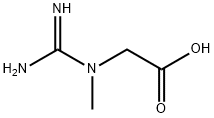A2302712
Creatine , 98% , 57-00-1
Synonym(s):
(α-Methylguanido)acetic acid;N-Amidinosarcosine;Creatine monohydrate
CAS NO.:57-00-1
Empirical Formula: C4H9N3O2
Molecular Weight: 131.13
MDL number: MFCD00004282
EINECS: 200-306-6
| Pack Size | Price | Stock | Quantity |
| 25G | RMB25.60 | In Stock |
|
| 100G | RMB60.80 | In Stock |
|
| 500G | RMB145.60 | In Stock |
|
| others | Enquire |
Update time: 2022-07-08
PRODUCT Properties
| Melting point: | ~295 °C (dec.) |
| Boiling point: | 242.43°C (rough estimate) |
| Density | 1,33 g/cm3 |
| refractive index | 1.5700 (estimate) |
| storage temp. | Keep in dark place,Inert atmosphere,Room temperature |
| solubility | Water (Slightly, Heated) |
| pka | 2.63(at 25℃) |
| form | Solid |
| color | White to Off-White |
| Water Solubility | Soluble in water. |
| Merck | 14,2568 |
| BRN | 907175 |
| InChIKey | CVSVTCORWBXHQV-UHFFFAOYSA-N |
| LogP | -1.258 (est) |
| CAS DataBase Reference | 57-00-1(CAS DataBase Reference) |
| NIST Chemistry Reference | Glycine, N-(aminoiminomethyl)-N-methyl-(57-00-1) |
| EPA Substance Registry System | Glycine, N-(aminoiminomethyl)-N-methyl- (57-00-1) |
Description and Uses
Creatine is involved in the rapid production of ATP associated with creatine kinases in skeletal muscle tissue. Creatine may be used as a supplement to study its mechanism of action. It acts as a nutraceutical and a neuroprotective agent.
Safety
| Symbol(GHS) |  GHS07 |
| Signal word | Warning |
| Hazard statements | H315-H319-H335 |
| Precautionary statements | P261-P280a-P304+P340-P305+P351+P338-P405-P501a |
| Hazard Codes | Xi |
| Risk Statements | 36/37/38 |
| Safety Statements | 26-36 |
| WGK Germany | 3 |
| TSCA | Yes |
| HS Code | 29252900 |
| Hazardous Substances Data | 57-00-1(Hazardous Substances Data) |
| Toxicity | A compound that is phosphorylated to phosphocreatine, which represents a store of high-energy phosphoryl groups in muscle that can be transferred to ADP, yielding ATP for muscle contraction. The enzyme involved in phosphate transfer between them is creatine phosphokinase that catalyzes the reaction Phosphocreatine+ADP→ATP+creatine An increase in serum creatine phosphokinase may be indicative of damage to non-hepatic tissue but not to the liver. |



